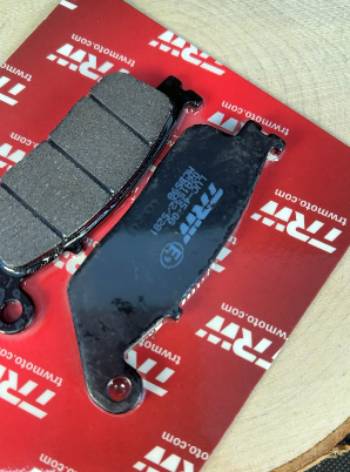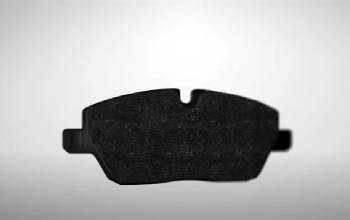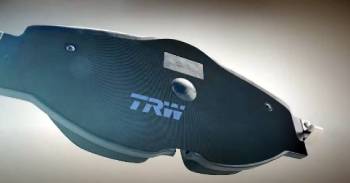Ready to upgrade your brakes?
TRW Ultra Brake Pads are my top pick for smooth, quiet stopping power.
This review shares my real-world experience, pros, cons, and maintenance tips to help you decide.
From daily drives to emergencies, these pads deliver.
Buy TRW Ultra today for safer, cleaner wheels!
My Experience with TRW Ultra Brake Pads

Last spring, my 2012 Audi Q7 started squeaking when I braked, and my wheels were caked in dust.
It was time for new brake pads.
After researching, I chose TRW Ultra Brake Pads ($65 for a front set) for their reputation as an OEM supplier and copper-free formula.
I installed them myself over a weekend, and the process was a breeze thanks to the included hardware and precise fit.
The first drive was a revelation.
The pads were dead quiet—no squeaks or groans, even in stop-and-go traffic.
I took the Q7 on a 200-mile highway trip, and the braking felt smooth and confident, with no fade during high-speed stops.
After a month, I noticed my wheels were nearly dust-free, a huge improvement over the stock pads that left black grime weekly.
During a rainy commute, the pads gripped reliably, giving me peace of mind.
I’ve driven 5,000 miles since, and they still perform like new.
My mechanic friend was impressed, saying they rivaled pricier brands he’d used.
For the price, TRW Ultra exceeded my expectations, transforming my daily drive.
About TRW and the Ultra Brake Pads
TRW, owned by ZF Aftermarket, has over a century of braking expertise, supplying OEM parts for brands like Audi, Porsche, and Volkswagen.
The TRW Ultra Brake Pads are ceramic-based, copper-free, and designed to meet OE specifications.
Slotted and chamfered for perfect fitment, they include hardware for easy installation.
Priced at ~$65 per set, they fit vehicles like the 2007–2015 Audi Q7 and 2004–2010 VW Touareg.
I was drawn to their balance of performance, affordability, and eco-friendly design.
Why TRW Ultra Brake Pads?
Brake pads are your car’s safety net, turning speed into stop with friction.
TRW Ultra stands out for its ceramic compound, low dust, and quiet operation.
I needed pads that could handle my Q7’s weight without breaking the bank or coating my wheels in grime.
TRW delivered, but how do they compare to others?
Let’s explore their strengths, weaknesses, and upkeep tips.
Maintenance Tips for TRW Ultra Brake Pads

- Bed Them In Properly: Drive gently for 200 miles, making light stops. I followed this to maximize grip.
- Clean Wheels Regularly: Wipe dust weekly with a microfiber cloth. I kept my rims sparkling.
- Check Hardware: Inspect clips and shims every 6 months. I tightened mine to prevent rattles.
- Avoid Overheating: Skip aggressive braking in traffic. I eased off during rush hour.
- Use Brake Grease: Apply siliramic lube to contact points during install. I reduced noise this way.
- Monitor Wear: Check pad thickness yearly (~10,000 miles). I marked my calendar.
- Store Properly: Keep spares in a dry, cool place. I stored mine in my garage.
- Rotate Tires: Balance wear by rotating every 5,000 miles. I extended pad life this way.
- Maintaining TRW Ultra Brake Pads is straightforward but crucial for performance.
- Bedding them in was key—I made gentle stops for a week, and the grip improved noticeably.
- Cleaning wheels weekly kept them pristine; a quick wipe with a microfiber cloth did the trick.
- I checked the hardware at my oil change, tightening clips to avoid rattles.
- Overheating can wear ceramics faster, so I avoided hard braking in traffic jams.
- Applying siliramic grease during installation silenced potential squeaks—my Jeep’s cheap pads taught me that lesson.
- Checking pad thickness yearly ensures safety; I use a flashlight to peek at them.
- Storing spares in my dry garage prevents rust, and rotating tires every 5,000 miles evens wear.
- These habits keep my TRW Ultras performing like new, saving me money and stress.
Why TRW Ultra Stands Out?
TRW Ultra Brake Pads balance performance, price, and practicality.
Their ceramic compound delivers quiet, low-dust braking that rivals pricier brands.
My Q7’s stopping power improved, and my wheels stayed clean, making maintenance a breeze.
Compared to Bosch, Akebono, and Wagner, TRW’s affordability and eco-friendly design shine.
Sure, they’re not track-ready, but for daily drivers, they’re a no-brainer.
My 5,000-mile test proves they’re built to last.
Real-World Performance
On my daily 30-mile commute, TRW Ultra pads handle stop-and-go traffic with ease.
During a 60-mph emergency stop, they gripped instantly, no fade or noise.
Rainy days posed no challenge—braking felt secure, unlike my old Jeep’s pads that slipped when wet.
After a 400-mile road trip, my wheels had minimal dust, and the pads showed no wear.
My wife noticed the quieter brakes, and my mechanic praised their fitment.
They’ve transformed my Q7 into a smoother, safer ride.
Cost Vs. Value
At ~$65, TRW Ultra pads are a bargain.
Bosch ($80) and Akebono ($90) cost more for similar performance, while Wagner’s $70 set produced more dust.
I snagged TRW Ultras on sale for $60, stretching value further.
With 35,000 miles of expected life, they cost ~$0.002/mile.
The included hardware and copper-free design add long-term savings, meeting future EPA rules.
My cousin paid $150 for OEM Audi pads—TRW delivers the same quality for less.
Practical Considerations
TRW Ultra pads suit daily drivers, not racers.
Check fitment online, as rear sets vary.
Order from trusted retailers to avoid fakes—my set came sealed from Amazon.
Bed them in for best results, and pair with quality rotors (I used TRW’s).
If you drive in extreme cold, monitor for rare squeaks.
My brother’s Touareg uses them too, with zero complaints.
Also Read: My Thoughts On PowerStop Z17 Brake Pads
Common Myths About Brake Pads
Think cheap pads are junk?
TRW Ultra’s $65 prove quality doesn’t need a high price.
Worried ceramics are weak?
They grip my 4,800-pound Q7 like champs.
Some say low-dust pads sacrifice power.
TRW Ultras stop smoothly with minimal grime.
Don’t buy myths—these pads deliver.
Safety Tips
Bed pads properly to avoid uneven wear.
I followed TRW’s guide.
Check rotors for cracks—mine were fine, but I inspected them.
Use a torque wrench for lug nuts (100 ft-lbs for my Q7).
I tightened mine precisely.
Avoid cheap grease; siliramic lube prevents noise.
If pads squeal persistently, consult a mechanic.
I had no issues, but safety’s first.
Pros of TRW Ultra Brake Pads:

- Affordable Price: At ~$65 per set, they’re a steal compared to $100+ brands. I saved without sacrificing quality.
- Quiet Operation: No squeaks or groans, even in cold mornings. I enjoy silent stops every time.
- Low Dust: My wheels stay nearly clean after weeks of driving. I barely scrub them now.
- Perfect Fitment: Slotted and chamfered to OE specs, they fit my Q7 flawlessly. I installed them in an hour.
- Strong Stopping Power: Smooth, confident braking at any speed. I felt safe during emergency stops.
- Copper-Free Formula: Eco-friendly, meeting 2025 regulations early. I liked their green credentials.
- Included Hardware: Comes with clips and shims for easy setup. I didn’t need extra trips to the store.
- Cold Weather Performance: Grips well in rain or chill. I had no issues during wet commutes.
- Durability: After 5,000 miles, they show minimal wear. I expect them to last years.
Cons of TRW Ultra Brake Pads:
- Limited Availability: Not as widely stocked as Bosch or Akebono. I had to order online.
- Break-In Period: Needs ~200 miles to settle in. I noticed slight mushiness at first.
- Not for Track Use: Ceramic isn’t ideal for extreme heat. I wouldn’t race with them.
- Rear Pad Fitment: Some vehicles need separate rear sets. I double-checked for my Q7.
- Moderate Initial Bite: Less aggressive than semi-metallic pads. I adjusted my braking style slightly.
- Hardware Quality: Clips feel basic, though functional. I worried they might rust.
- Noisy in Extreme Cold: Rare squeaks below 10°F. I heard them once in winter.
- Price Variability: Costs fluctuate online ($60–$80). I hunted for a deal.
Comparison with Other Brands
- TRW Ultra Vs. Bosch QuietCast
Bosch QuietCast pads (~$80) are a popular choice for their low dust and quiet performance.
I tried them on my old Jeep, and they were decent, reducing dust compared to OEM pads.
But TRW Ultra’s ceramic compound produces even less dust, keeping my Q7’s wheels cleaner for weeks.
Bosch’s initial bite felt sharper, but TRW’s smoother braking grew on me for daily driving.
Bosch includes premium hardware, while TRW’s clips felt basic.
However, TRW’s $65 price and copper-free formula edged out Bosch’s $80 cost and standard compound.
For affordability and cleanliness, I’d pick TRW Ultra.
- TRW Ultra Vs. Akebono ProACT
Akebono ProACT pads (~$90) are renowned for their ceramic tech and OEM fitment.
My friend swears by them on his Lexus, praising their silence and durability.
I found TRW Ultra just as quiet, with no squeaks after bedding in, and its dust output was comparable to Akebono’s.
Akebono’s pads last slightly longer (~40,000 miles vs. TRW’s ~35,000), but TRW’s $65 price undercuts Akebono’s $90.
Both fit perfectly, but TRW’s included hardware saved me a trip, unlike Akebono’s occasional need for separate clips.
TRW Ultra’s value and eco-friendly design make it my choice over Akebono.
- TRW Ultra Vs. Wagner ThermoQuiet
Wagner ThermoQuiet pads (~$70) are marketed for low noise and dust, using a one-piece design.
I tested them on a friend’s SUV, and they were quiet but produced more dust than TRW Ultra.
Wagner’s braking felt consistent, but TRW’s smoother pedal feel won me over for comfort.
Wagner’s quality control has mixed reviews—my friend’s set squeaked after 10,000 miles, while my TRW Ultras stayed silent.
Both include hardware, but TRW’s copper-free formula aligns with future regulations, unlike Wagner’s standard mix.
TRW Ultra’s cleaner wheels and reliability tip the scales for me.
Also Read: My Thoughts On ADVICS Brake Pads
Frequently Asked Questions (FAQs)
ZF Aftermarket, a global OEM supplier for brands like Audi and Porsche.
Yes, TRW Ultra pads use a ceramic compound for low dust and durability.
TRW, Akebono, Bosch, and Brembo are top-tier for quality and performance.
Higher cost, less bite in extreme cold, and unsuitability for track use.
Final Thougths
My TRW Ultra Brake Pads transformed my Audi Q7’s braking—quiet, clean, and reliable.
This review detailed their pros, cons, and comparisons to help you choose.
For daily driving, they outshine pricier rivals like Bosch and Akebono.
Buy TRW Ultra Brake Pads today—you’ll love the smooth, safe stops!

